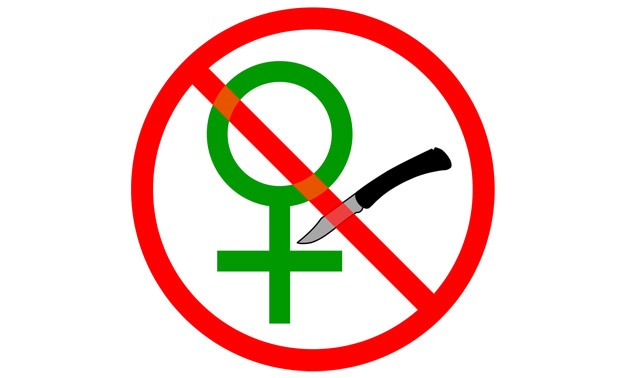
No-FGM Via Wikimedia Commons
CAIRO – 13 July 2017: Seventeen governmental medical colleges approved to teach anti- FGM (Female Genital Mutilation) curricula in both women’s obstetrics and gynecology sections from the next academic year, announced the Ministry of Health and Population.
Exclusive for Youm7, the Minister of Health and Population Ahmed Emad El-Din asserted that this initiative, led by the program against female genital mutilation in the National Council of Population, has succeeded, in collaboration with Supreme Council of Universities, in communicating with the governmental medical colleges to formulate a curriculum that aims to combat FGM.
Accordingly, the initiative coordinator, Abdel Hamid Attia, clarified that four medicine faculties (Assiut, Ain Shams, Sohag, Zagazig) that have officially addressed the Supreme Council of Universities to adopt anti-circumcision curricula, and based on which the Supreme Council will send these curricula within days to all universities to start teaching them during the next academic year.
Teaching anti-FGM curriculum in medical schools is a step to reduce the practice of this crime; especially that 85 percent of these illegal and immoral practices are carried out by doctors and nurses in clinics or homes, said Emad.
In the same manner, Attia said that this is an important step for the education of more than 30 thousand doctors annually.
He further pointed out that the upcoming period will be an introduction for the curricula in the private universities, clarifying that this move is meant to raise awareness for 90,000 private medical facilities.
Attia added that the Ministry would re-distribute fatwas and ministerial decrees that ban FGM in hospitals.
A 2013 UNICEF report, which investigated FGM in 29 countries, claimed that Egypt has one of the highest numbers of females who have undergone FGM. The number totals up to 27.2 million women.
The report stated that 77 percent of female circumcisions were performed by a medical professional.

The means of awareness will also include and define the official penalties for both doctors and nurses, mentioned Attia.
In August 2016, the Egyptian Parliament toughened the penalties for FGM. Those who perform the operation could face seven years in prison, and 15 years if the girl dies as a result of the procedure
Furthermore, Tarik Tawfik, rapporteur of the National Council for Population, said that National Program efforts to combat female genital mutilation have succeeded in reducing the rate of FGM among girls aged 15-17 years from 74 percent in 2008 to 61percent in 2014, according to the health survey issued by the Ministry of Health 2014.
Earlier in May 2017, the directors of the obstetrics and gynecology departments of all Egyptian universities announced that an anti-FGM curriculum will be developed and taught in all medical departments beginning 2018.
Female genital mutilation, once referred to as female circumcision, typically involves removing all or part of the clitoris. The practice is banned by several international treaties but remains a practice in some African countries, including Somalia, Sudan and Egypt. Operations are often carried out by unqualified surgeons in unsanitary conditions.
The World Health Organization (WHO) estimated that at least 200 million girls and women in 30 countries alive today have undergone FGM, which can cause lasting health problems and can even lead to death.
The procedure was first called "mutilation" following the National Council of Churches in Kenya in 1929, where it was referred to as the “sexual mutilation of women.” The term "female genital mutilation" was not commonly used until the 1990s, when organizations such as the World Health Organization began using the now-common terminology.
In Egypt, researchers and other historians have claimed that the practice can be traced to the era of the Pharaohs. The aim was to control women's sexuality and fertility by tampering with their genitalia.
The impacts of FGM on women have proven to be devastating, from bleeding to death to infertility, infection and sexual dysfunction.
The practice of FGM in Egypt has come to be regarded as a socially acceptable practice that is claimed to make females less sexually active and/or to withhold sexual activity before marriage. Sexual promiscuity and premarital sex remain highly controversial in Egyptian society.

Comments
Leave a Comment